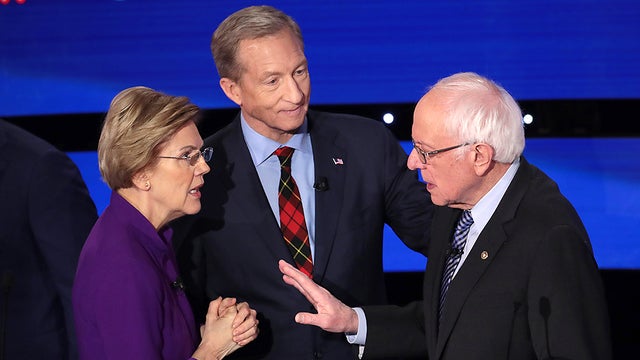Schism on the Left: The Seventh Democratic Debate
DES MOINES, IOWA—In the seventh televised Democratic primary debate, hosted jointly by CNN and the Des Moines Register on January 14, 2020, six Democratic candidates for president gathered on stage at Drake University in Des Moines, Iowa: Joe Biden, Bernie Sanders, Elizabeth Warren, Pete Buttigieg, Amy Klobuchar, and Tom Steyer. Continuing the trend of voting low-polling candidates off the island with each successive debate, Taiwanese-American entrepreneur Andrew Yang failed to qualify, leaving the stage all-white for the first time—a disappointing ending for a historically diverse field. As the final debate before Iowa hosts its all-important caucus, with its traditional power to make or break candidacies, the stakes were higher than ever.
The spotlight was on Senators Bernie Sanders and Elizabeth Warren, whose months-long non-aggression pact had frayed with the release of news the day before that Sanders had claimed that “a woman couldn’t win” against Trump during a private conversation in 2018. The news ignited a crossfire, with long-simmering tensions between the two allies boiling over. For months Sanders staffers had griped about Warren declining to endorse Sanders in the 2016 primary and running to the right of him on issues like healthcare; this new development seemed confirmation that she was a “fake” progressive. On the other hand, Warren allies leapt to her defense, pointing out that despite the Sanders campaign’s incessant sniping at her, for months Warren had largely stifled any criticism of Sanders coming from her ranks, instead opting to promote a message of unity.
On the debate stage, the two candidates finally confronted each other face to face. Sanders asserted that “anybody [who] knows me knows that it’s incomprehensible that I would think that a woman cannot be president of the United States” and pointed out how he had deferred to Warren in the 2016 election; it was only when Warren decided not to run that he himself mounted his own bid. He complained about how “this is what Donald Trump and maybe some of the media want,” as CNN had long been documented to exhibit a bias against Sanders’s candidacy, and both Warren and Sanders allies had expressed concerns about how the entire squabble was manufactured by CNN to drive apart the progressive wing of the party.
In response, Warren confirmed that Sanders did say to her that a woman couldn’t win in 2020, but instead of actually accusing Sanders of being sexist, she instead attributed it to the larger narrative of women not being considered “electable” enough. Warren explained that “this question about whether or not a woman can be president has been raised, and it’s time for us to attack it head-on.” She went on to cuttingly point out that collectively the men onstage had lost ten elections. Instead, it was only herself and Senator Amy Klobuchar, the two female candidates on stage, who had been undefeated, or unseated a Republic incumbent in the past thirty years.
The debate apparently did little to smooth ruffled feathers. After it concluded, as the candidates drifted off the stage, Warren and Sanders had another heated exchange. Warren rebuffed Sanders’s handshake and said “I think you called me a liar on national TV”, whereupon Bernie retorted with “Let’s not do it right now. You want to have that discussion, we’ll have that discussion. You called me a liar.” Since then the two have apparently cleared up the misunderstanding behind closed doors, even linking arms in at a Martin Luther King, Jr. Day march. Furthermore, a recent news story from The Intercept raised eyebrows when it revealed the press had known about the incident for over a year; the timing of CNN’s report breaking the news the day before its own debate was further evidence for a manufactured rift either for ratings or more sinister purposes, as the schism on the left benefits only their rivals for the nomination.
In particular, Vice President Joe Biden stands to gain considerably from a progressive falling-out. The long-awaited Biden implosion has failed to materialize, and the former Vice President heads into Iowa with solid poll numbers both in the state and nationally. Throughout the debate, Biden again remained where he was most comfortable: blending in with the backdrop, playing the role of the serene elder statesman above the fray. So far candidates who have mounted attacks on “Teflon Joe” have seen them backfire or slide right off, as Kamala Harris, Julian Castro, and Eric Swalwell (all of whom have since dropped out) have found out to their dismay. Nor have his numerous campaign gaffes made a dent in his numbers; rather, they seem only to play into his image as the backslapping everyman.
Meanwhile, Pete Buttigieg and Amy Klobuchar are both hungrily advancing in Iowa, peddling their next-door credentials as moderate, sensible Midwesterners. Being from a Rust Belt state, Indiana for Buttigieg and Minnesota for Klobuchar, has been a considerable asset in the primary, especially in a party still reeling from Donald Trump’s upset victory in 2016 smashing through the blue wall of Wisconsin, Michigan, and Pennsylvania. Their campaigns are largely distinguished only by flavor—whether voters prefer their moderate policies served up by a young gay Harvard-Oxford technocrat with no national experience, or a tough former prosecutor with a reputation as a Senate work horse and a merciless boss—rather than being meaningfully differentiable on position.
Billionaire Tom Steyer continued to fail to justify his presence onstage, with his only noteworthy moment being his accidental intrusion into the Warren-Sanders feud when he awkwardly hovered between the two after the debate as he waited to “say hi” to Bernie. The main reason Steyer has survived through the debates was pumping $100 million in advertisements into early states like Nevada and South Carolina; even in that regard he is being blown out of the water by fellow billionaire Michael Bloomberg, who has saturated the airwaves with nearly $200 million in advertisement. Rivals have accused Bloomberg, who has imperiously refused to take donations and thus failed to qualify for the debates, of seeking to avoid a confrontation with candidates like Warren, who has famously made a billionaire tax one of her policy cornerstones.
Save the salvos exchanged between Warren and Sanders, the rest of the debate was largely unremarkable. Biden, Buttigieg, and Klobuchar continued their push for moderation and prudence, while Warren, Sanders, and Steyer continued to advocate progressive policy positions. The rift between moderates and progressives was visible in a wide variety of issues from the threat of war with Iran to the USMCA trade deal negotiated by Trump to education, but that was hardly different from any of the prior debates. The Democratic Party is fiercely grappling with its own identity, lurching from left to center to left again; even past Iowa, even past Super Tuesday, possibly even past the convention, this seems a problem unlikely to be resolved soon.






























